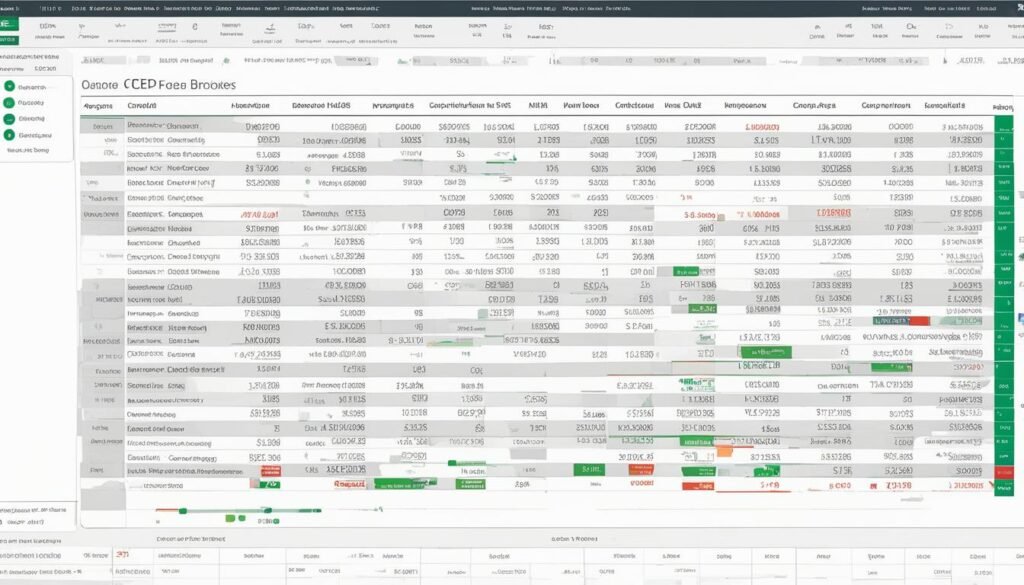Understanding CBN Regulated Entities in Nigeria
The Central Financial institution of Nigeria (CBN) serves because the apex financial authority in Nigeria and regulates monetary establishments working within the nation. As such, any enterprise working in Nigeria’s monetary sector falls underneath CBN’s purview and should adjust to its rules. On this part, we’ll present an summary of CBN regulated entities in Nigeria and the function of the Central Financial institution of Nigeria in monetary regulation.
Key Takeaways:
- CBN is the apex financial authority in Nigeria and regulates monetary establishments working within the nation.
- All companies working in Nigeria’s monetary sector should adjust to CBN rules.
- Understanding CBN regulated entities is essential for companies working in Nigeria.
- The CBN performs a big function in sustaining monetary stability in Nigeria.
- CBN regulatory pointers are essential for companies to comply with to make sure compliance.
The Regulatory Framework in Nigeria
In Nigeria, monetary regulation is overseen by the Central Financial institution of Nigeria (CBN). The CBN has established a set of rules and insurance policies that govern banking rules in Nigeria, together with people who apply to CBN regulated entities.
The regulatory framework in Nigeria is designed to keep up a steady banking system and safeguard the pursuits of shoppers. The CBN’s regulatory framework contains pointers for danger administration, capital necessities, and reporting obligations, amongst others.
Entities that fall underneath CBN regulation should adjust to these rules and insurance policies to keep away from penalties or fines. Non-compliance with CBN regulatory necessities can lead to reputational harm and even the revocation of an organization’s license. Subsequently, being compliant with CBN rules is essential for entities working in Nigeria.
| Key CBN Laws and Insurance policies | Description |
|---|---|
| Anti-Cash Laundering (AML) Tips | Tips aimed toward stopping cash laundering and countering the financing of terrorism in Nigeria’s monetary sector. |
| Prudential Tips | Tips outlining the minimal capital necessities, risk-weighted property calculation, and liquidity ratios for regulated entities. |
| Client Safety Tips | Tips aimed toward selling shopper safety, honest remedy, and monetary literacy amongst prospects of regulated entities. |
| Solvency Tips | Tips describing the strategies used to evaluate the solvency of regulated entities to make sure they meet monetary fee obligations. |
Compliance with CBN rules and insurance policies is critical for CBN licensed corporations and different CBN regulated entities to function with out dealing with regulatory motion. Failure to fulfill the regulatory necessities can result in sanctions corresponding to warnings, fines, and license revocation.
CBN Regulatory Tips
As a CBN regulated entity working in Nigeria, compliance with CBN rules is of utmost significance. The CBN has established particular regulatory pointers that should be adopted to make sure that entities function inside the confines of the legislation and keep monetary stability. These pointers are designed to advertise transparency, accountability, and good governance.
“The regulatory pointers prescribed by the Central Financial institution of Nigeria are aimed toward guaranteeing that CBN regulated entities function in a fashion that’s in line with the legal guidelines of the land and in the perfect curiosity of all stakeholders. Compliance with these rules isn’t an possibility, it’s necessary.”
The Significance of Compliance with CBN Laws
Failure to adjust to CBN rules may result in extreme penalties, together with financial penalties, lack of license, reputational harm, and authorized motion. It’s, due to this fact, important for entities to implement sufficient measures to make sure compliance with CBN rules. These measures could embrace common compliance critiques, the institution of a compliance division, and the appointment of a compliance officer to supervise regulatory compliance.
CBN Regulatory Tips: An Overview
The CBN regulatory pointers cowl a variety of areas, together with capital adequacy, danger administration, asset classification, provisioning, and reporting necessities. The rules additionally stipulate the minimal necessities for the institution and operation of assorted monetary establishments, corresponding to microfinance banks, mortgage banks, and growth finance establishments.
The desk beneath supplies an summary of a number of the key regulatory pointers prescribed by the CBN:
It’s essential for entities to make sure that they adjust to all related regulatory pointers to keep away from working afoul of the legislation and probably struggling extreme penalties.
CBN Licensing Course of
Working as a licensed firm in Nigeria is a big achievement for companies, and the Central Financial institution of Nigeria (CBN) is chargeable for granting licenses to certified entities that meet the regulatory requirements. The CBN licensing course of is designed to make sure that corporations working in Nigeria adhere to the strictest monetary rules and pointers.
The CBN licensing course of includes assembly sure necessities and submitting the suitable documentation. The necessities for licensing could range relying on the kind of establishment, however a number of the primary components required embrace proof of incorporation, compliance with the CBN regulatory pointers, and sufficient capitalization.
To begin the licensing course of, the possible firm should submit an utility to the CBN and full the related kinds. After the applying is acquired, CBN conducts a radical analysis to make sure the applicant meets all of the required regulatory standards.
As soon as the applying has been accepted, the CBN points a license and supplies pointers for working as a CBN licensed entity. Firms that obtain a license from CBN are acknowledged as working on the highest degree of compliance in accordance with Nigerian monetary rules, which creates a way of belief and credibility with prospects, buyers, and different stakeholders.
It’s essential for corporations to adjust to CBN rules with a purpose to keep their license and keep away from penalties for non-compliance. Correct compliance additionally helps corporations to mitigate danger and construct long-term relationships inside the world monetary market.
Forms of CBN Regulated Entities
CBN regulation encompasses numerous entities working within the Nigerian monetary sector. These entities should adjust to CBN regulatory pointers and necessities to proceed their operations and keep their license standing.
Business Banks: Business banks are the most important gamers in Nigeria’s banking trade, offering a variety of companies to people and companies alike. These banks are required to fulfill the minimal capital adequacy ratio set by the CBN and comply with banking rules in Nigeria.
Microfinance Banks: Microfinance banks present monetary companies to low-income households and the small-scale enterprise sector. These banks cater to the financially excluded segments of society and provide loans, financial savings, and insurance coverage merchandise.
Growth Finance Establishments: Growth finance establishments are specialised monetary establishments that cater to the event wants of particular sectors, corresponding to agriculture, trade, and commerce. These establishments present long-term funding and play a vital function in boosting the nation’s financial progress.
Fee Resolution Service Suppliers (PSSPs): PSSPs are monetary know-how corporations that present modern fee options to companies and people. These corporations facilitate digital funds and provide digital wallets, cellular banking, and different fee choices.
Different Monetary Establishments: Aside from the above-mentioned entities, CBN regulation additionally covers different monetary establishments corresponding to mortgage banks, finance corporations, and bureaux de change. These entities provide specialised monetary companies and merchandise and are required to adjust to CBN regulatory pointers.

You will need to observe that each one of those entities should be licensed by the CBN to function in Nigeria. Being a CBN licensed firm ensures compliance with CBN rules and instills buyer confidence within the entity’s means to supply secure and dependable monetary companies.
Compliance Points and Challenges
Whereas complying with CBN rules is essential for entities working in Nigeria, it usually poses important challenges. One of many main challenges is the complexity and ever-changing nature of CBN regulatory necessities. Maintaining with these adjustments may be exhausting, leaving many companies struggling to stay compliant.
One other important problem is the price of compliance. In some instances, compliance with CBN rules could require important monetary investments, which is usually a pressure on smaller companies or new entrants into the market. This monetary burden can lead some corporations to take shortcuts or ignore sure rules altogether.
Non-compliance with CBN rules can have critical penalties, together with fines, authorized penalties, revocation of licenses, and harm to an organization’s repute. The price of non-compliance may be far larger than the price of compliance.
Overcoming compliance challenges requires a proactive strategy that features common communication with the CBN, coaching of employees on regulatory necessities, use of know-how to streamline regulatory processes, and a powerful compliance tradition all through the group.
Desk 1 beneath illustrates some widespread compliance points confronted by CBN regulated entities:
| Compliance Situation | Impression |
|---|---|
| Lack of expertise of regulatory necessities | Inadvertent non-compliance, fines, reputational harm |
| Poor record-keeping practices | Issue in demonstrating compliance, fines |
| Inadequate staffing and technological assets | Incapability to fulfill regulatory necessities, fines |
| Non-disclosure of knowledge | Lack of license, authorized penalties, reputational harm |
It’s important for CBN regulated entities to remain abreast of regulatory necessities and prioritize compliance to keep away from important monetary and reputational dangers.
Function of CBN in Safeguarding Monetary Stability
As the first regulatory physique overseeing the Nigerian monetary system, the Central Financial institution of Nigeria (CBN) performs a vital function in sustaining monetary stability and safeguarding the pursuits of stakeholders. The CBN’s oversight features contain supervising and regulating monetary establishments to make sure compliance with banking rules in Nigeria.
The CBN has carried out plenty of initiatives to advertise a sound banking system, which incorporates guaranteeing compliance with capital adequacy necessities, sustaining sturdy danger administration practices, and selling transparency and accountability. By implementing these measures, the CBN helps to forestall systemic dangers and cut back the probability of economic instability. The CBN additionally works intently with different regulatory our bodies to make sure a coherent and efficient regulatory framework for the trade.
The CBN’s dedication to safeguarding monetary stability is underscored by its proactive strategy to managing potential threats to the trade. As an example, the CBN has launched measures to include the impression of exterior financial shocks, corresponding to fluctuations in oil costs, and has carried out insurance policies to assist monetary inclusion, which improves entry to monetary companies for underserved demographics.
Finally, the CBN’s function in safeguarding monetary stability is important to selling sustainable financial progress and growth in Nigeria. By sustaining a sound banking system and guaranteeing compliance with banking rules, the CBN supplies a steady basis for companies to function and for the financial system to thrive.
The Impression of CBN Laws on Nigerian Banking
| Regulatory Measure | Impression |
|---|---|
| Capital Adequacy Necessities | Ensures that monetary establishments have sufficient capital to soak up potential losses, which makes them extra resilient to financial shocks and reduces the probability of failure. |
| Minimal Liquidity Ratios | Requires banks to keep up a sure degree of liquid property to make sure that they will meet their monetary obligations to prospects. This helps to forestall financial institution runs and maintains public confidence within the banking system. |
| Prudential Limits on Mortgage Focus | Locations limits on the amount of cash that banks can lend to particular debtors or sectors, which reduces the danger of mortgage defaults and minimizes the impression of financial shocks on the banking system. |
| Company Governance Tips | Promotes transparency, accountability, and accountable administration practices inside monetary establishments, which reduces the probability of fraud, mismanagement, and monetary instability. |
Impression on Enterprise Operations
The Central Financial institution of Nigeria (CBN) rules have a big impression on the day-to-day operations of regulated entities in Nigeria. Entities should adhere to sure CBN regulatory necessities, together with capital necessities, reporting obligations, and danger administration practices.
One of many major impacts of CBN regulatory necessities is on capital necessities. Regulated entities should keep minimal capital ratios, which might have an effect on their lending capability and general monetary well being. Failure to fulfill these necessities can lead to penalties and sanctions from the CBN.
Reporting obligations are one other important side of CBN rules. Regulated entities should submit periodic experiences to the CBN, together with monetary statements, danger administration experiences, and compliance experiences. These experiences may be time-consuming and require important assets, however they’re important for sustaining compliance with CBN rules.
Threat administration practices are additionally closely regulated by the CBN. Entities should implement complete danger administration frameworks to establish, measure, and handle their dangers successfully. The CBN could conduct periodic inspections to make sure that entities are complying with these necessities and taking applicable actions to mitigate their dangers.
| Impression | Rationalization |
|---|---|
| Elevated Compliance Prices | The price of implementing and sustaining complete compliance measures may be important. |
| Diminished Lending Capability | The capital necessities can restrict the lending capability of regulated entities, impacting their progress potential. |
| Improved Threat Administration | The concentrate on danger administration practices can lead to a extra sturdy and safe monetary system. |
General, whereas complying with CBN rules could also be difficult, it’s essential to function in Nigeria’s monetary sector. Regulated entities that prioritize compliance and efficient danger administration practices can profit from a extra steady monetary system, improved repute, and elevated belief from prospects and stakeholders.
Collaboration between CBN and Different Regulatory Our bodies
The Central Financial institution of Nigeria collaborates with different regulatory our bodies in Nigeria to make sure that there’s a coherent and efficient regulatory framework that promotes monetary stability. The CBN works intently with the Securities and Alternate Fee (SEC), the Nigerian Deposit insurance coverage Company (NDIC), and the Nationwide Insurance coverage Fee (NAICOM), amongst others.
The CBN’s regulatory insurance policies and pointers are carried out in collaboration with these organizations, guaranteeing that Nigeria’s monetary system is powerful, dependable and guarded. The SEC, NDIC, and NAICOM work in tandem with the CBN to observe and regulate the monetary markets, insurance coverage, and banking sectors.
Partnership with the Securities and Alternate Fee (SEC)
The SEC is chargeable for regulating the securities market in Nigeria. The CBN and SEC work collectively to make sure that the monetary markets are clear, honest, and free from fraudulent actions. The partnership permits for the efficient implementation of insurance policies that govern the securities market and enhances buyers’ safety.
| Advantages of CBN and SEC Partnership |
|---|
| Enhanced investor safety |
| Clear and honest monetary market |
| Collaborative coverage implementation |
Collaboration with the Nigerian Deposit insurance coverage Company (NDIC)
The NDIC supplies a security web for depositors in CBN-regulated entities corresponding to banks, whereas additionally selling sound banking practices. The CBN works with the NDIC to make sure that the deposit insurance coverage system is efficient and that banks comply with the perfect practices.
| Advantages of CBN and NDIC Partnership |
|---|
| Secure and safe deposit insurance coverage system |
| Encourages sound banking practices |
| Mitigates monetary danger |
Collaboration with the Nationwide Insurance coverage Fee (NAICOM)
The CBN additionally works with the NAICOM to manage the insurance coverage sector in Nigeria and promote a steady insurance coverage trade. The NAICOM’s pointers and insurance policies be sure that insurance coverage suppliers function on a sound foundation, offering shopper safety. The CBN helps this initiative, emphasizing the significance of sound insurance coverage and the safeguarding of policyholders’ pursuits.
| Advantages of CBN and NAICOM Partnership |
|---|
| Steady insurance coverage trade |
| Client safety |
| Emphasis on sound insurance coverage practices |
The collaborative efforts between the CBN and different regulatory our bodies in Nigeria have facilitated the implementation of efficient regulatory frameworks and insurance policies. This has resulted in a steady monetary system that protects the pursuits of shoppers whereas additionally selling financial progress.
Client Safety Measures
The Central Financial institution of Nigeria (CBN) implements regulatory pointers that safeguard the pursuits of consumers of regulated entities. Compliance with CBN rules is essential for entities to make sure that they function inside the ambit of the legislation. Laws such because the Client Safety Framework present larger safety and recourse for purchasers of CBN regulated entities.
The framework mandates that banks and different monetary establishments take essential measures to make sure that prospects are usually not topic to unfair remedy or exploitation. This contains offering sufficient details about monetary services, defending buyer info, and dealing with buyer complaints in a well timed and environment friendly method.
Moreover, the CBN has arrange Client Safety Division (CPD) to resolve complaints and be sure that prospects are handled pretty. The CPD is chargeable for implementing guidelines associated to prohibited practices, and guaranteeing compliance with buyer safety rules. In keeping with its goal of selling transparency and accountability, the CBN has made info obtainable to prospects on redress mechanisms and dispute decision procedures.
The CBN’s dedication to shopper safety has been lauded each nationally and internationally. Its efforts have contributed considerably to enhancing the protection and soundness of the Nigerian monetary system, and its pointers and insurance policies function greatest observe fashions for different nations.
Worldwide Recognition of CBN Laws
The Central Financial institution of Nigeria has been profitable in gaining worldwide recognition for its rules and insurance policies. The CBN’s efforts to advertise monetary stability and create a sound banking system have been acknowledged and counseled by worldwide stakeholders.
This recognition has had a constructive impression on the notion of Nigeria’s monetary sector by overseas buyers. Because the repute of the CBN’s rules grows, extra overseas buyers are keen to put money into Nigeria, boosting the nation’s financial system.
As well as, the worldwide recognition of CBN rules has resulted in elevated cooperation and collaboration between the CBN and different central banks internationally. This collaboration has led to the adoption of improved monetary insurance policies and practices, benefiting the Nigerian financial system and the broader world monetary system.
Making certain Efficient Enforcement
Efficient enforcement is vital to sustaining the integrity of Nigerian monetary regulation and guaranteeing that entities ruled by CBN regulatory necessities function in compliance with the legislation. The CBN employs numerous enforcement mechanisms to attain this goal, together with fines, penalties, and different disciplinary actions in opposition to non-compliant entities.
Entities discovered to be in violation of CBN regulatory pointers could also be topic to varied sorts and ranges of sanctions based mostly on the severity and length of the non-compliance. These sanctions could embrace revocation of licenses, restrictions on enterprise operations, suspension of board members or government officers, and even prison prosecution in egregious instances.
Given the potential ramifications of non-compliance, it’s crucial that entities working in Nigeria stay constantly vigilant in guaranteeing compliance with CBN rules and pointers. Compliance not solely helps to keep away from authorized penalties but additionally promotes a tradition of belief and integrity with prospects and different stakeholders.
| Enforcement Motion | Description |
|---|---|
| Fines | Financial penalties issued to entities discovered to be in violation of CBN rules. |
| License Revocation | Cancellation of an organization’s license to function as a CBN regulated entity because of sustained non-compliance or different infractions. |
| Suspension of Board Members | Elimination of board members or government officers deemed culpable in instances of non-compliance or misconduct. |
| Restrictions on Enterprise Operations | Limitations on the scope or scale of an organization’s operations, often issued as a penalty for non-compliance. |
Efficient enforcement is important to sustaining a sound regulatory framework and preserving the integrity of the Nigerian monetary sector. Entities working in Nigeria should stay dedicated to upholding the excessive requirements of compliance required by CBN rules and pointers.
Evaluating the Way forward for CBN Laws
The Central Financial institution of Nigeria is dedicated to making sure the soundness of Nigeria’s monetary system by means of its regulatory pointers, insurance policies and numerous different initiatives, and its rules are anticipated to evolve in response to the altering monetary panorama. The CBN’s regulatory pointers are designed to safeguard the pursuits of companies and shoppers whereas selling financial progress. As such, entities that function in keeping with these rules can anticipate to be higher outfitted to cope with the challenges that lie forward.
In evaluating the way forward for CBN rules, it is very important observe that technological developments and altering buyer behaviors are prone to result in important adjustments within the monetary sector within the coming years. As such, the CBN is prone to introduce measures to deal with rising points corresponding to fintech and cryptocurrency, whereas additionally frequently reviewing present rules to make sure they continue to be related and efficient.
Entities that keep up-to-date with the most recent CBN regulatory necessities and pointers can be higher positioned to thrive in an ever-changing and aggressive enterprise surroundings. Holding abreast of those adjustments and being proactive in adapting to new regulatory developments is important for companies trying to stay compliant and achieve a aggressive edge.

“The regulatory panorama is continually evolving, and companies must be on high of those adjustments and their implications with a purpose to succeed”
Conclusion
In Nigeria, being CBN regulated (NG) is an important side of doing enterprise within the monetary sector. Compliance with CBN rules and insurance policies is crucial for entities working in Nigeria to keep up their licenses and keep away from the implications of non-compliance.
From the overview of CBN regulated entities to the licensing course of, compliance challenges, shopper safety measures, and the way forward for CBN rules, this text has offered a complete understanding of CBN regulation.
Moreover, the function of the CBN in safeguarding monetary stability in Nigeria and the collaborative efforts with different regulatory our bodies have contributed to a sound and sturdy banking system within the nation.
As Nigeria’s monetary sector features worldwide recognition for adhering to CBN rules, it’s important for companies to make sure efficient enforcement. The potential future developments in CBN rules have important implications for companies working in Nigeria.
In conclusion, companies that fall underneath CBN regulation (NG) should prioritize compliance with regulatory pointers and the necessities set forth by the CBN. Adhering to CBN rules is integral to sustaining the license to function and fostering shopper confidence in Nigeria’s monetary sector.
FAQ
What are CBN regulated entities?
CBN regulated entities are monetary establishments, together with industrial banks, microfinance banks, and different monetary establishments, that function in Nigeria and are topic to the regulatory oversight of the Central Financial institution of Nigeria (CBN).
What’s the function of the Central Financial institution of Nigeria in monetary regulation?
The Central Financial institution of Nigeria (CBN) is chargeable for formulating and implementing financial coverage, sustaining monetary stability, and regulating the Nigerian monetary system. It units rules, pointers, and insurance policies that govern CBN regulated entities and ensures compliance with these necessities.
What’s the regulatory framework in Nigeria?
The regulatory framework in Nigeria consists of the rules, insurance policies, and pointers established by the CBN and different regulatory our bodies to manipulate the operations of economic establishments, promote stability, and shield the pursuits of consumers and the general financial system.
What are the CBN regulatory pointers?
The CBN regulatory pointers are particular guidelines and necessities issued by the Central Financial institution of Nigeria to manage the actions of economic establishments. These pointers cowl numerous features, corresponding to capital adequacy, danger administration, company governance, shopper safety, and reporting obligations.
How does the CBN licensing course of work?
The CBN licensing course of includes a radical evaluation of the applicant’s monetary functionality, competence, and compliance with regulatory necessities. To acquire a license from the CBN, candidates should meet particular standards, submit essential documentation, and endure a complete analysis course of.
What varieties of entities fall underneath CBN regulation?
CBN regulated entities embody a variety of economic establishments, together with industrial banks, microfinance banks, mortgage banks, finance corporations, bureaux de change, and different non-bank monetary establishments working in Nigeria.
What are the compliance points and challenges confronted by CBN regulated entities?
CBN regulated entities face numerous compliance points and challenges, corresponding to assembly capital necessities, implementing efficient danger administration techniques, guaranteeing company governance practices, and adhering to stringent reporting obligations and regulatory pointers.
What’s the function of the CBN in safeguarding monetary stability?
The CBN performs a vital function in safeguarding monetary stability in Nigeria. It oversees the operations of regulated entities, displays systemic dangers, implements insurance policies to forestall monetary crises, and takes corrective measures to keep up a sound and steady banking system.
How do CBN rules impression enterprise operations?
CBN rules impression enterprise operations by imposing capital adequacy necessities, mandating common reporting and disclosure, setting pointers for danger administration and compliance, and influencing operational processes and strategic decision-making of regulated entities.
How does the CBN collaborate with different regulatory our bodies in Nigeria?
The CBN collaborates with different regulatory our bodies in Nigeria, such because the Securities and Alternate Fee (SEC) and the Nigeria Deposit Insurance coverage Company (NDIC), to make sure a coordinated regulatory framework and efficient supervision of the monetary sector.
What shopper safety measures are carried out by the CBN?
The CBN implements numerous shopper safety measures to safeguard the pursuits of consumers of regulated entities. These measures embrace pointers for honest and accountable banking practices, dispute decision mechanisms, and guaranteeing sufficient disclosure of phrases and circumstances to prospects.
How are CBN rules acknowledged internationally?
CBN rules are acknowledged internationally, which boosts the notion of Nigeria’s monetary sector by worldwide stakeholders. This recognition contributes to the nation’s repute as a reputable and well-regulated monetary market, facilitating overseas investments and partnerships.
How does the CBN guarantee efficient enforcement of its rules?
The CBN employs numerous enforcement mechanisms to make sure compliance with its rules. These mechanisms embrace on-site inspections, off-site monitoring, penalties for non-compliance, license revocation, and collaboration with legislation enforcement companies to analyze and prosecute violations.
What can we anticipate for the way forward for CBN rules?
The way forward for CBN rules could contain additional enhancements to the prevailing regulatory framework, integration of technological improvements, alignment with worldwide requirements, and steady efforts to advertise monetary stability, shopper safety, and environment friendly operations of regulated entities in Nigeria.

 New York Stock Exchange
New York Stock Exchange Australian Stock Exchange
Australian Stock Exchange Toronto Stock Exchange
Toronto Stock Exchange Johannesburg Stock Exchange
Johannesburg Stock Exchange Bombay Stock Exchange
Bombay Stock Exchange New Zealand Stock Exchange
New Zealand Stock Exchange Nigerian Stock Exchange
Nigerian Stock Exchange Kenya Stock Exchange
Kenya Stock Exchange






















 Kraken is a well-regulated and trusted crypto dealer that gives aggressive charges and a variety of buying and selling choices. The platform has sturdy safety measures, together with two-factor authentication and chilly storage, to make sure the protection of person funds. Nevertheless, Kraken’s buyer assist just isn’t as responsive as different brokers, which can pose challenges for learners.
Kraken is a well-regulated and trusted crypto dealer that gives aggressive charges and a variety of buying and selling choices. The platform has sturdy safety measures, together with two-factor authentication and chilly storage, to make sure the protection of person funds. Nevertheless, Kraken’s buyer assist just isn’t as responsive as different brokers, which can pose challenges for learners.






